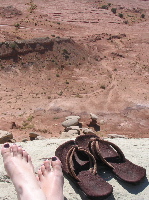Philosophia Naturalis #12
So I decided a while back that in doing Philosophia Naturalis #12, I was going to have a really awesome theme, but I haven't been able to come up with a good one. At first, I was thinking I'd do a magic or Harry Potter themed post, and indeed there have been several reports in the blagosphere about the science behind Harry Potter. Anne-Marie at Pondering Pikaia has tackled such issues as the botany of wands, the genetics of wizardry, and other such biological quandries. Or, if you're like me and much more worried about things like energy and momentum in your fantasy stories and movies, Blake at Science after Sunclipse will remind you exactly which aspects of physics need to be ignored (or simply to become more, ah, flexible) in order to actually enjoy, say, the X-Men. But even though I'm going to be picking my copy of Book 7 up from the local Barnes and Noble at midnight Friday night, I'm really not enough of a fangirl (and, indeed, all of the hype is getting rather annoying, though the geeking is rather fun) to allow this analogy to go much further.
With Brian May of Queen finally getting his PhD (and giving a few talks along the way), I considered doing some sort of rockstar themed post, but really, there isn't much else there.
The adventure role-playing game theme can be applied to most anything. You could be a skepchick doing research out in the middle of the Indian Ocean, forced to send blog updates in via a co-blogger (such as parts one, two, three, four, five, aaaaand six ... and while you're over there, you might as well vote in the Mr. Wizard video competition). But then, as you're going along, minding your own business as you try to steal a shopping cart, you're thwarted! Blake Stacey at Science after Sunclipse has the story.
Or, not. And this is where I remember that, oh yeah, I actually find themed blog carnival posts mildly annoying because they're usually really difficult to read. I just want a nice list of blog posts, with perhaps a few words of description for each.
- Surprisingly, I only saw one mention of the science behind fireworks, even in a time period covering Canada Day, (the American) Independence Day, and Bastille Day.
- Scott Aaronson wants to know: why are mass and charge so different? One affects the geometry of the universe, but the other ... not so grand.
- If you're trying to keep track of the current count of interesting planets without actually trying to digest astro-ph every day, Steinn over at Dynamics of Cats can help you out. In particular, there is supposedly an extrasolar planet now with water detected in its atmosphere; how much stock you put in three data points with large error bars is up to you. Steinn was also particularly excited over the first "true" Jupiter analog outside our solar system.
- Pamela Gay has a few words to say on some recently very high redshift galaxies and their possible implications for the epoch of reionization.
- In the realm of the small, Charles Daney at Science and Reason has a few words to say about axions, a likely candidate for the elusive dark matter.
- In other news, the Sun is not a cause of global warming, but the snows of Kilamanjaro may be disappearing for non-global warming reasons.
- If you like your blog posts interesting, but with no unique theme, check out Jennifer Ouellette's recent discussion of fast hybrid cars, cloud chambers, and iron science teachers.
- There has also been some discussion over what happened before the Big Bang; Sean Carroll at Cosmic Variance discusses why a "bouncing" universe doesn't really make sense.
- Clifford Johnson finally got to use the post title There Will Be No Dawn, as he discusses the future of the Dawn mission to go visit the asteroid belt.
- Chris Rowan at Highly Allochthonous has a neat post on the history of the moon's orbit—based on geological evidence.


2 comments:
Nice! Thanks for the publicity, of course, and the reading material. I see I missed a few of these the first time around, so I definitely appreciate the pointers.
This is a very nice post
Post a Comment